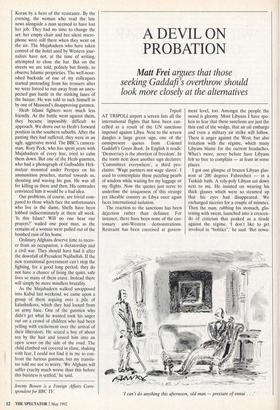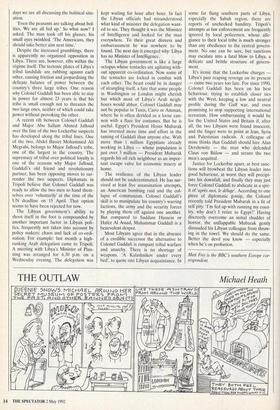A DEVIL ON PROBATION
Matt Frei argues that those
seeking Gaddafi's overthrow should look more closely at the alternatives
Tripoli AT TRIPOLI airport a screen lists all the international flights that have been can- celled as a result of the UN sanctions imposed against Libya. Next to the screen dangles a large green sign, one of the omnipresent quotes from Colonel Gaddafi's Green Book. In English it reads: 'Democracy is the abortion of freedom'. In the room next door another sign declares: 'Committees everywhere', a third pro- claims: 'Wage partners not wage slaves'. I used to contemplate these puzzling pearls of wisdom while waiting for my luggage or my flights. Now the quotes just serve to underline the uniqueness of this strange yet likeable country as Libya once again faces international isolation.
The reaction to the sanctions has been dejection rather than defiance. For instance, there have been none of the cus- tomary anti-Western demonstrations. Restraint has been exercised at govern- ment level, too. Amongst the people the mood is gloomy. Most Libyans I have spo- ken to fear that these sanctions are just the thin end of the wedge, that an oil embargo and even a military air strike will follow. There is anger against the West, but also irritation with the regime, which many Libyans blame for the current headaches. What's more, never before have Libyans felt so free to complain — at least in some places.
I got one glimpse of brazen Libyan glas- nost at 200 degrees Fahrenheit — in a Turkish bath. A roly-poly Libyan sat down next to me. He insisted on wearing his thick glasses which were so steamed up that his eyes had disappeared. We exchanged niceties for a couple of minutes. Then the man, rubbing his stomach, glis- tening with sweat, launched into a crescen- do of criticism that peaked as a tirade against the regime. 'I don't like to get involved in "bolitics",' he said. 'But nowa- 'I can't do anything this afternoon, old man — pressure of ennui . . days we are all discussing the bolitical situ- ation.
'Even the peasants are talking about bol- itics. We are all fed up.' So what now? I asked. The man took off his glasses, his small eyes twinkled. 'The Americans, they should take better aim next time.'
Despite the increased grumblings, there is apparently no organised opposition in Libya. There are, however, rifts within the regime itself. The tectonic plates of Libya's tribal landslide are rubbing against each other, causing friction and jeopardising the delicate balance of power between the country's three large tribes. One reason why Colonel Gaddafi has been able to stay in power for almost 23 years is that his tribe is small enough not to threaten the two large ones, neither of which could take power without provoking the other.
A recent rift between Colonel Gaddafi and Major Abu Sallam Ahmed Jalloud over the fate of the two Lockerbie suspects has developed along the tribal lines. One of the two, Abdel Basset Mohammed Ali Megrahi, belongs to Major Jalloud's tribe, one of the largest in the country. The supremacy of tribal over political loyalty is one of the reasons why Major Jalloud, Gaddafi's old friend and revolutionary partner, has been opposing moves to sur- render the two suspects. Diplomats in Tripoli believe that Colonel Gaddafi was ready to allow the two men to hand them- selves over 'voluntarily' at the time of the UN deadline on 15 April. That option seems to have been rejected for now.
The Libyan government's ability to shoot itself in the foot is compounded by another important factor in Libyan poli- tics, frequently not taken into account by policy makers: chaos and lack of co-ordi- nation. For example: last month a high- ranking Arab delegation came to Tripoli. A meeting with Libya's Minister of Plan- ning was arranged for 6.30 p.m. on a Wednesday evening. The delegation was kept waiting for hour after hour. In fact the Libyan officials had misunderstood what kind of minister the delegation want- ed to see. They thought it was the Minister of Intelligence and looked for the man everywhere. To their great distress and embarrassment he was nowhere to be found. The next day it emerged why: Libya has no Minister of Intelligence.
The Libyan government is like a large octopus whose tentacles are agitating with- out apparent co-ordination. Now some of the tentacles are locked in combat with each other. The beast could be in danger of strangling itself, a fate that some people in Washington or London might cherish but which most of Libya's Arab neigh- bours would abhor. Colonel Gaddafi may not be popular in Tunis, Cairo or Amman, where he is often derided as a loose can- non with a flare for costumes. But he is useful. Egypt's President Hosni Mubarak has invested more time and effort in the taming of Gaddafi than anyone else. With more than 1 million Egyptians already working in Libya — whose population is just over 3 million — President Mubarak regards his oil rich neighbour as an impor- tant escape valve for economic misery at home.
The resilience of the Libyan leader should not be underestimated. He has sur- vived at least five assassination attempts, an American bombing raid and the col- lapse of communism. Colonel Gaddafi's skill is to manipulate his country's warring factions, the army and the security forces by playing them off against one another. But compared to Saddam Hussein or Hafez Al Assad, Muhammar Gaddafi is a benevolent despot.
Most Libyans agree that in the absence of a credible successor the alternative to Colonel Gaddafi is rampant tribal warfare and anarchy. There is no shortage of weapons. 'A Kalashnikov under every bed', to quote one Libyan acquaintance. In some far flung southern parts of Libya, especially the Sabah region, there are reports of unchecked banditry. Tripoli's attempts at law enforcement are frequently ignored by local policemen, whose alle- giance to their local tribe is much stronger than any obedience to the central govern- ment. No one can be sure, but sanctions may escalate into a fatal blow to Libya, a delicate and brittle structure of govern- ment.
It's ironic that the Lockerbie charges Libya's past reaping revenge on its present — came two years too late. For since 1990, Colonel Gaddafi has been on his best behaviour, trying to establish closer ties with the West, keeping a low and neutral profile during the Gulf war, and even promising to stop supporting international terrorism. How embarrassing it would be for the United States and Britain if, after all, the two Libyans were found innocent, and the finger were to point at Iran, Syria and Palestinian radicals. A colleague of mine thinks that Gaddafi should hire Alan Dershowitz — the man who defended Claus von B0low — and secure the two men's acquittal.
Justice for Lockerbie apart, at best sanc- tions will browbeat the Libyan leader into good behaviour, at worst they will precipi- tate his downfall, and finally they may just force Colonel Gaddafi to abdicate in a spir- it of `apres moi, le deluge'. According to one piece of diplomatic gossip, the Colonel recently told President Mubarak in a fit of self pity: 'I'm fed up with running my coun- try, why don't I retire to Egypt?' Having discreetly overcome an initial shudder of horror, the unflappable Mubarak gently dissuaded his Libyan colleague from throw- ing in the towel. We should do the same. Better the devil you know — especially when he's on probation.
Mau Frei is the BBC's southern Europe cor- respondent.



















































 Previous page
Previous page